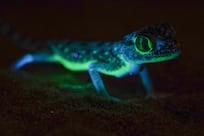The grind of the 21st century throws up obstacles at every turn. Nikolaus Oliver is on hand with advice to guide you through. This week: what we can learn from the wallaby. Some months ago we pondered the mystery of crop circles and what we may refer to as "the wallaby factor", for these not-quite-kangaroos are the cause of the circular crop perturbations in faraway Tasmania. Now wallabies are popping up in story after story in the press.
It started when I was reading about the apparently legendary Las Vegas entertainer Wayne Newton. Mr Newton, it seems, has been so busy entertaining that he forgot he had parked his aeroplane at Oakland County international airport three years ago and never came back to collect it. The airport is now asking for US$60,000 (Dh220,000) in storage fees. The plane has also seized up and it will cost a further $30,000 to move it elsewhere.
That's bad, obviously, but Mr Newton is in even deeper water now: his pet wallaby, called Priscilla, went walkabout, triggering a panic in the streets of Las Vegas. The BBC informed an expectant world that "wallabies have powerful legs, which make them difficult to capture". Ah, that would be the problem in a nutshell, then. In Florida, on February 2, a dozen wallabies were cruelly poisoned at the home of Wendy Ohleyer who breeds them (why would anyone want to breed them - in Florida or anywhere else?) She accused the Florida Fish and Wildlife Commission of not doing enough to capture the killer. They responded by revealing that she herself is under investigation for cruelty to wallabies, arising out of the fact that she had them living inside her house. She's offering $500 (Dh1,840) for information.
But from Australia comes heartwarming news. Robyn Coy and her helpers have nursed a group of wallabies back to health after they were burnt and traumatised in the Black Saturday bush fires of 2009. The fires (visible from space) burnt their little claws off and left them nothing to eat. But under Robyn's tender ministrations, they have recovered and by the summer the little bounders should be ready for release.
Improbable as it seems then, wallabies are a sort of canary in the mine of human-animal relations. Their experience reflects all the disregard, perverseness and wickedness of how we treat animals, but also our kindness, care and fellow feeling. So, next time you see one bouncing down the road, buffing up its toenails or pushing an aeroplane along, have a care.





